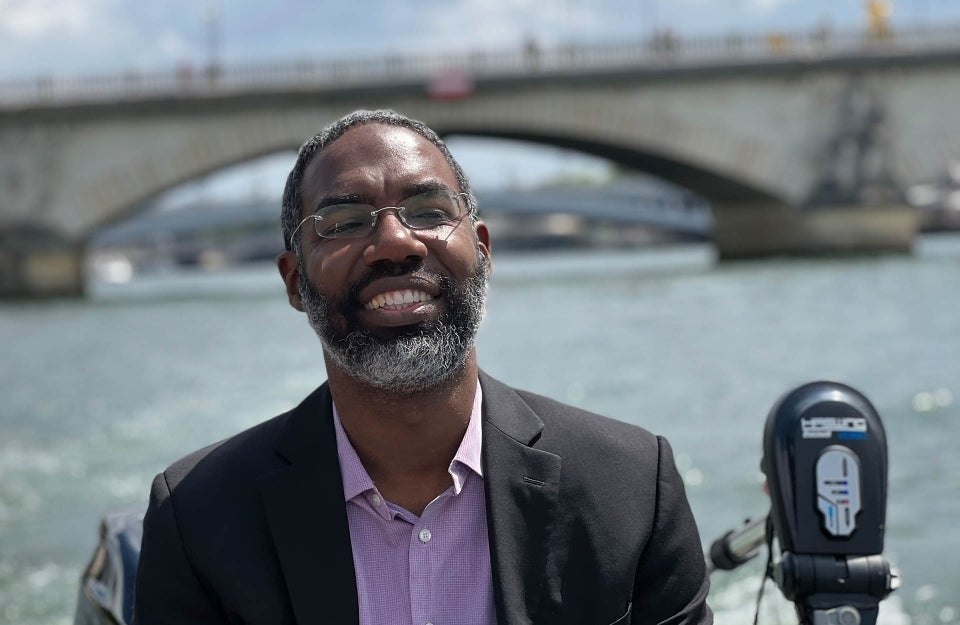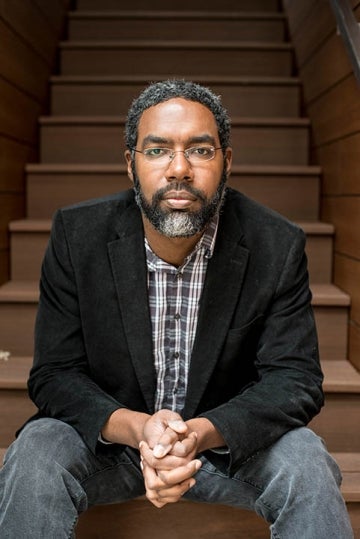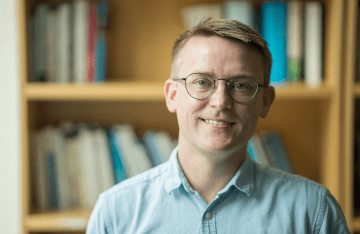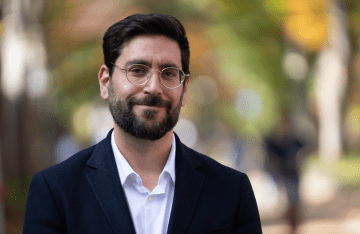Political and Computational Researcher Deen Freelon to Join Annenberg School Faculty
Freelon, a specialist in the way social media and digital technology are used to express individuals’ politics and identities, will begin on July 1.

Photo Credit: Deen Freelon
In 1924, Allan Randall Freelon Sr. graduated with a B.S. in Education from the University of Pennsylvania. He went on to be an acclaimed artist and the first Black art supervisor of the Philadelphia School District. His son grew up in the Philadelphia area, as did his grandson.
When Allan’s great-grandson, Deen Freelon, joins the Annenberg School for Communication as a full professor on July 1, he will not only become a fourth-generation Philadelphian, but one with a special connection to his ancestor: Professors at Annenberg typically have endowed chairs named for a person of their choosing, and so 99 years after his great-grandfather’s graduation, Freelon will become the Allan Randall Freelon Sr. Professor of Communication.
Currently based at the University of North Carolina’s Hussman School of Journalism and Media, Freelon is known for developing software tools that apply computational social science methods to questions about how ordinary people use digital media for political purposes, with a particular eye to how identity characteristics — particularly race, gender, ideology — affect this use.
His research, which has appeared in journals including Nature, Science, and Proceedings of the National Academy of Science (PNAS), deals with issues including mis/disinformation, conspiracy theories, hyperpartisan content, ideological asymmetry, identity politics, and personalized information environments.
He has been a principal researcher at UNC’s Center for Information, Technology, and Public Life (CITAP), which examines the nexus of technology platforms and democratic society.
“I Should Study This.”

Freelon came to the study of Communication after an “old-fashioned epiphany.” It was 2005, three years after he earned his undergraduate degree in Psychology from Stanford University. He was working in information technology at Duke University, in his hometown of Durham, N.C. MySpace was the leading social media platform, the blogosphere was booming, and phones with tiny keyboards were state-of-the-art.
At the same time, he was also becoming more politically engaged, attending activist gatherings in the area. He saw tremendous potential in the use of technology in politics, and was struck by a thought: “I should study this.”
Though he was an avid amateur computer programmer, Communication was the field that most clearly addressed his interests. He enrolled in an M.A. and then a Ph.D. program at the University of Washington, and for his dissertation, Freelon studied how the structure of online platforms influenced the quality and content of discussion their users produced.
Right Place, Right Time
He had only just started working on that dissertation when two threads of his life came together: his then girlfriend, now wife, was working as a journalist in Washington, D.C. and hoped their relationship would eventually no longer be long-distance. Fortuitously, American University’s School of Communication had a tenure-track opening. Freelon was hired with the understanding that he would quickly finish his dissertation.
After six years, during which he earned tenure, Freelon received a job offer to be an associate professor at UNC, where he has been since 2017. That move back to his hometown was well timed, as it also allowed him to be near his father, architect Philip Freelon, who had been diagnosed with ALS in 2016 and passed away in 2019.
How about Penn?
In 2021, while talking to a colleague at another university, Freelon mused that he’d be interested in a position somewhere between North Carolina and New York, in or close to a larger city, and with resources that would allow him to level up his work. The colleague said, ”What about Penn?”
When Dean John L. Jackson, Jr. heard Freelon might be interested in a position at the Annenberg School, he reached out and invited Freelon to be one of the school’s Katz Colloquium speakers.
Freelon spoke about PIEGraph, an open-source application he created with a colleague to be able to study individual users’ social media environments, what he calls the “user-eye view.” With it, he was able to gather data on what a large number of individual social media users chose to see in their feeds when they were on Twitter. (Twitter shut down free access to its API in April 2023, so data of this kind is now prohibitively expensive.)
Current Research
Analyzing the Twitter data he was able to gather prior to the API closure will be a significant focus of the coming year, says Freelon.
“There has been a fair amount of research on what users have clicked on, but we’re not just interested in what they’ve clicked on, but also reconstructing their Twitter information environments,” says Freelon. “By connecting survey data with their timeline data, we can figure out how their opinions are connected to the information they viewed.”
It is a rich and unique data set, Freelon says, and one that should yield a number of publications in the coming year, and hopefully some novel insights.
Freelon is also keenly aware that the loss of Twitter data access changes the game for how scholars study social media. Currently, his pinned Twitter thread offers alternate tools and data sets.
He is interested in pushing forward the study of political video and podcasts as well, using software to create text transcripts that facilitate analysis. He also recently developed a TikTok scraper called pyktok. “It’s been somewhat supplanted by the new TikTok API,” he says, “but it’s something you don’t need corporate approval to use. It’s important to be able to study social media without the company dictating the terms.”
"Deen Freelon's important scholarship analyzes the varied ways in which citizens deploy and navigate a complex social media landscape in their attempts at civic engagement,” says Dean Jackson, citing Freelon’s study of social media use in the context of the Arab Spring protests, the Black Lives Matter movement, and the increasing sociopolitical threats posed by disinformation and misinformation.
“Deen has made significant contributions to the broad field of computational social science, which is an area that Annenberg and Penn continue to prioritize. He is going to be an incredibly important member of a campus-wide cohort of scholars working in this space for many years to come."
Making New Mixtapes
Outside of his academic work, Freelon likes to run and is a long-time music connoisseur. Last summer, Freelon was scanning music-centric Meetup groups in the Research Triangle area, but decided that if he was going to participate, he wanted to be precise in finding musical kindred spirits.
So he started his own group to discuss popular music. “It’s like a book club for mix tapes,” he explains. “We are superfans, and approach our discussions quasi-academically.”
Every month, the group, which attracts people of all ages and walks of life, contributes to a “mixtape” (really an online playlist) of songs around a theme like “notable cover songs” or “songs about locations.” They then listen in advance and get together in person to discuss them.
When Freelon settles in Philadelphia, he plans to create a new chapter of the group.
“It’s such a wonderful privilege to come to Penn as a full professor and honor my great-grandfather in the process,” says Freelon. “I can’t wait to bring Annenberg’s resources to bear on some of the most pressing research questions at the intersection of identity and digital politics.”



